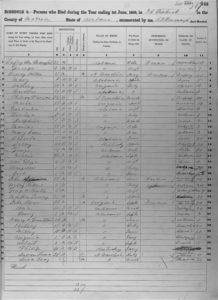Alabama Mortality Census Records
The 1850, 1860, 1870, 1880, and 1885 censuses included inquiries about persons who had died in the twelve months immediately preceding the enumeration. The 1850, 1960, 1870, and 1880 mortality census for Alabama all survived. Mortality schedules list deaths from 1 June through 31 May of 1849–50, 1859–60, 1869–70, 1879–80, and 1884–85. They provide nationwide, state-by-state death registers that predate the recording of vital statistics in most states. While deaths are under-reported, the mortality schedules remain an invaluable source of information.


